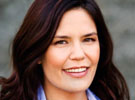Eyeing that pricey handbag? Prepare to be insulted
SMU Prof. Morgan Ward tested whether snobbery counts in making a pricey sale.

By Bob Sullivan
As a broke graduate student at the University of Texas four years ago, Morgan Ward had an Achilles' heel for luxury brands. But when she'd walk into a high-end store in less-than designer duds, the sales clerks weren't very accommodating.
"I asked to see a bag behind the counter and [a salesman] said, 'Well, I'll show it to you, but it's very expensive,' " Ward recalled.
But a curious thing happened when he said this.
"Despite the feeling of condescension, I noticed it didn't send me running out of the store," she said. In fact, it made her want the pricey bag even more. "[I thought,] I'll show him ... and I wondered if I was the only one.
It turns out she's not. Now a marketing professor at Southern Methodist University's Cox School of Business, Ward tested her theory with Darren W. Dahl of The University of British Columbia, in a study to be published in October's Journal of Consumer Research. In one of the experiments they found that consumers who were treated poorly by sales staff were willing to pay 10 percent more than others.
For the study, titled "Should the Devil Sell Prada?" researchers sent two groups of consumers into a simulated retail experience. One group encountered actors who were instructed to "take a long look at the participant at the door [and] appear unimpressed," among other rude behaviors. The control group entered a neutral environment.
The researchers then measured both groups' willingness to pay for the items in question, and found customers who had been insulted routinely said they'd pay more. In one scenario, insulted shoppers said they'd pay $31,000 for a hypothetical car being sold under the Toyota brand. The control group, on the other hand, said it was worth only $24,000.
Ward equated the reaction to high school kids who, when getting the cold shoulder from a member of the "in" crowd, work harder to be accepted. Being rejected by exclusive brands taps into the same human nature, Ward said.
"We are pack animals. We don't want to be rejected by any groups," she said.
# # #